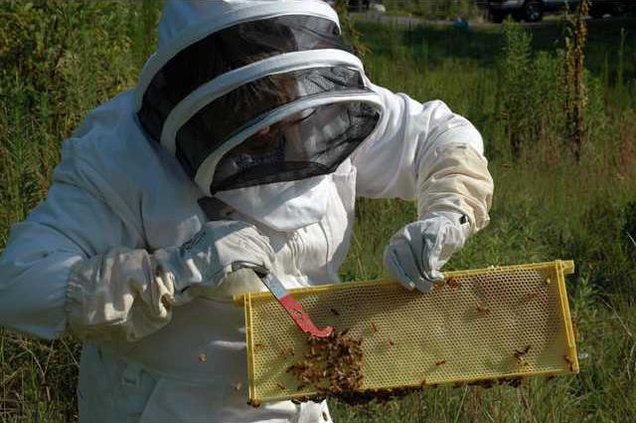Contact
• For more information on beekeeping or local harvesters call the Dawson County Extension office at (706)265-2442.
• The Amicalola Beekeepers Association meets the second Tuesday of every month at the Dawson County Extension Service Building, 298 Academy Ave.
With bees swarming around her head in the hot morning air, Jean Schilling prods and picks at the growing hive.
Unfazed and unafraid, the local beekeeper is dressed from head to toe as she swings the smoking canister to calm the bees. It's all part of the routine to check her five hives.
"They are so pretty and work so diligently," Schilling said while picking up a sheet holding hundreds of buzzing, crawling bees.
"I have always been respectful of the earth, but this has even made me more so because without these guys we don't have pollinators and we don't eat."
In recent years, beekeeping has become a growing trend in Dawson County and statewide.
According to the University of Georgia College of Agricultural and Environmental Sciences, Georgia has about 75,000 bee colonies and 2,000 commercial and hobby beekeepers.
Local beekeeping organizations, such as Amicalola Beekeepers Association, have sprung up to help and mentor new beekeepers.
According to Dawson County Extension Agent Clark MacAllister, Georgia ranks 14th in the nation for honey production and second in queen bee and packaged bee production.
And reports show bees are responsible for pollinating about 130 agricultural plants in the U.S., while honey bee pollination accounts for more than $70 million of Georgia's annual agriculture.
Relatively new to the practice herself, Schilling said during a recent visit that she started raising honeybees four years ago with one hive. With just a handful of hives, she still manages to produce enough honey to last her family all year.
Like many beekeepers, Schilling stresses the natural benefits of beekeeping and producing local honey.
"If you eat a little bit of honey every day, it's like an allergy shot," she said. "It helps build your immune system and it's such a small amount at a time it builds up.
"I notice even now if I don't eat my honey on a regular basis I actually don't feel well because it gives me the added vitamins and nutrients."
Schilling, who produces pure honey with no chemical pesticides, also points to the positive effect bees have on their immediate environment.
"Without them we would have to hand pollinate our plants and flowers ... and that's horrible," she said.
Dawsonville resident Ricky Parker agrees that bees are beneficial for the community. After raising them for seven years, he manages more than 32 hives and sells bees for a living.
Located off Hwy. 9, Parker said he has hives spread across five different fields. He admires the bees' work ethic.
"Bees are amazing. They each have a job ... They build comb, build house and make honey," he said.
Unlike some other local beekeepers, Parker said he focuses on selling the bees more than the honey.
Yet for beekeepers such as Schilling, the practice is just that, a practice. She said she harvests honey for the enjoyment of it and loves seeing the different kinds.
"Sometimes I will have four or five different jars of honey and I will hold them up to the sun and you can see the difference in the colors," she said. "This fall I will have buckwheat honey. It's really dark, almost like molasses. It is so rich. I use a lot of it in cooking."

